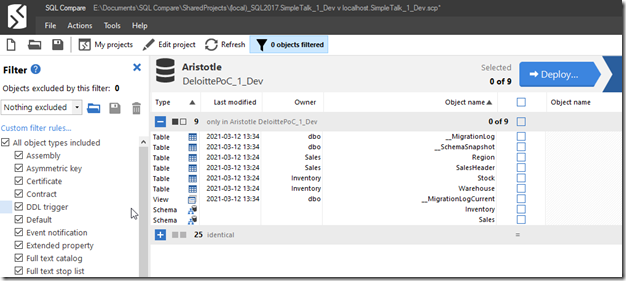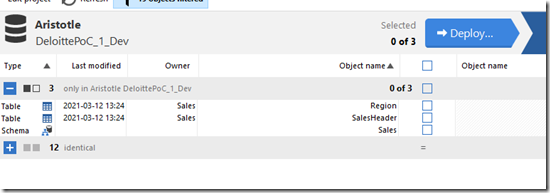One of the things that numerous clients have some to Redgate about is allowing a team of developers to work on a single shared database without creating conflicts. While this isn’t necessarily a simple thing to do, it is easy if you structure the projects appropriately. This post looks at one of those ways, with schema filtering.
In a recent case, a customer had multiple schemas, and they wanted a SQL Change Automation project scoped to a single schema. Easy enough to do, as a new project gives you a place to pick your filter, but in order to do that, you need to create it first in SQL Compare. This post looks at how to do that.
The Scenario
I created a demo database with a couple schemas inside, and a few objects inside. I had a blank database to simulate a new QA environment. I opened SQL Compare and created a new project, pointing to these two databases. From here, I want the initial comparison. you can see this below, with a number of objects listed in different schemas.
On the left is the filter pane, and near the top is a “Custom filter rules” link. I clicked this to open up the filter dialog. In here, I see a default set with no rules.
I added a new rule to set the schema name equal to “Sales”, to filter all objects away that do not exist in Sales. This is to give me a “Sales” project that developers can use in this schema.
I click OK, and then I refreshed the comparison. I saw this:
I still have the Inventory schema listed. That’s not ideal, as this could be confusing to juniors developers. Also, depending on the comparison options, this could allow dependent objects to leak into this project.
Filtering Schemas
Schemas are not owned by themselves, and are separate. As a result, I need an additional item in this filter. If I scroll down the left side, there is a “schema” checkbox. If I put my mouse on this, I can see that there is an “edit” link.
I click that and then create my filter rule. In this case, I want the “Object name” to equal Sales. The object is the schema.
Once I click OK, the Inventory schema disappears.
I need to repeat this for each schema that I want to build a filter for. Note that there isn’t a “save as” for filter files, so I need to manually copy each one in the file system when it is complete, or create a new SQL Compare project.
Summary
Once I have the filter files, I can load the appropriate one into each SCA project, allowing me to have projects that only see a small portion of the objects in a database.
One other thing I often do here is remove global type objects, like users, from the project as well by unchecking those boxes in the filter pane.
SQL Compare is an amazing tool that underpins much of what makes DevOps tools and automation work well with Redgate tools. I’d urge you to give it a try if you never have. You’ll be amazed as how much is helps you get work done quickly.








